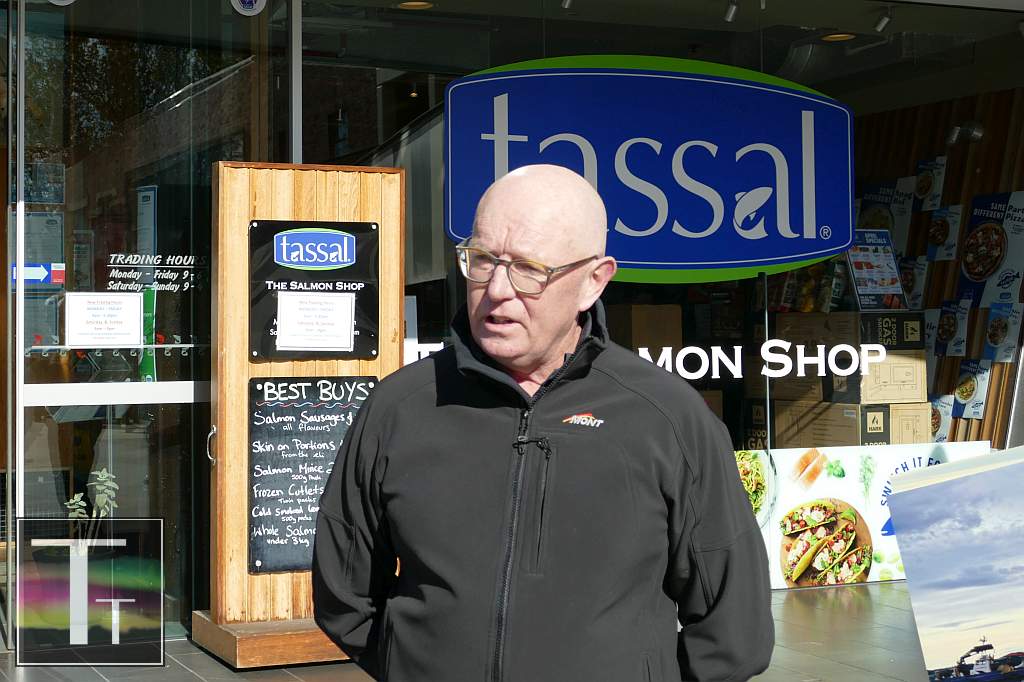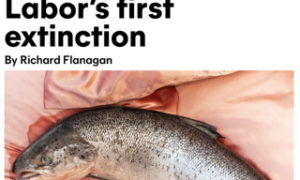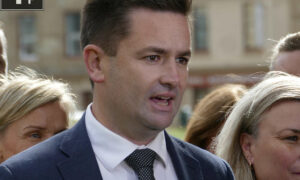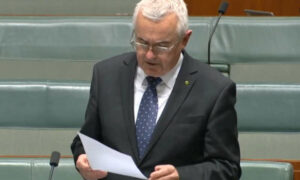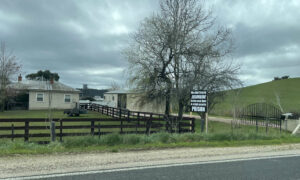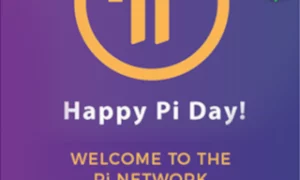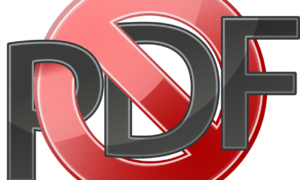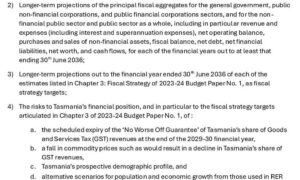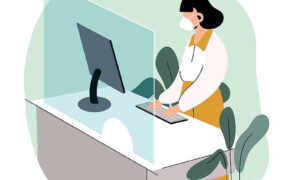Transcript of media conference with Gerard Castles of the Killora Community Association, Salamanca Place, Hobart, 26 April 2021.
Gerard Castles
All right. My name is Gerard Castles, I’m the spokesperson for the Killora Community Association. And with me here this morning is Rick Tipping who is also a member of the Killora Community Association. We’ve discovered that there was an industrial accident at Tassal’s Shepherds lease in the north D’Entrecasteux Channel on April 1 this year. At the time, we were investigating a noise complaint. And I actually took photos at the site to identify what the noise was. Subsequent to that, last week, we had an anonymous source come forward and tell us that on April 1 this year, a barge capsized at the Tassal site. And no details have been released to the public about this incident.
Journalist
Can you describe what you saw?
Gerard Castles
What we saw were a series of Tassal boats trying to retrieve a large object that was upside down in the water. And as I said, at the time, we didn’t know what that was. The key thing we’re concerned about is that we don’t know how many litres of diesel were on that object, how many cranes, what equipment, what chemicals have been released, We’re calling on the EPA and Tassal to re release the details of what happened on April 1 this year.
Journalist
Have you been in touch with them yet?
Gerard Castles
No. We’re going to lodge a formal complaint with the EPA today. And we’re going to call on them to investigate if they haven’t already and to release those details to the public.
Journalist
This comes at a particularly topical time. Can you give some context around what’s happening?
Gerard Castles
We’ve locally had a lot of issues with the salmon industry, around pollution of the channel, and noise. But one of the biggest issues we’re concerned about is secrecy and lack of transparency. And I think what we’re experiencing in the north D’Entrecasteux Channel is a warning to the communities in Tasmania that are going to have salmon on their doorstep, from Bridport, Wynyard, Rocky Cape, Table Cape, Boat Harbour, Sisters Beach. You’re going to experience what we experience, which is a shocking neighbour.
Journalist
For people that don’t know what it’s like to be so close to a fish farm, can you give us a snapshot?
Gerard Castles
We experience 24/7 industrial noise, like the type of machinery that’s overturned on the Shepherds lease. Large factory ships, barges, craft servicing the site, 24/7. And that’s what’s really got us worried about this industry in the first place. But as we dug deeper, we found a dirty rotten secret at the bottom of this salmon industry. And that’s the pollution it causes to the waterways and the damage it’s doing to the Tasmanian community.
Journalist
What did you make of Richard Flanagan’s book?
Gerard Castles
It was an absolute revelation. I’ve never seen a forensic examination of the Tasmanian salmon industry like it. And I think everyone in Tasmania should read that book. Because it displays publicly the dirty rotten lie that is the Tasmanian salmon industry.
Tasmanian Times
The industry regularly says that it complies with regulation. What’s going wrong? Is it that regulations are insufficient or the monitoring isn’t appropriate?
Gerard Castles
We we think the EPA isn’t doing its job. I heard the EPA referred to recently as the salmon protection industry. And I think that’s probably a good way to look at it. Because when we complain to the EPA, they wring their hands, but they don’t really do anything. As far as we know at that local site at Shepherds, the EPA has never ever fined Tassal for any breach. There isn’t supposed to be any material impact from salmon farming 35 metres outside the lease at Shepherds, and yet our own work has identified in the sea beds are dying underneath those leases. Where’s the EPA? Why don’t they stand up for the rights of Tasmanians to protect our environment rather than protecting the salmon industry?
Journalist
Do you think there’s a large part of Tasmanians for whom the salmon industry is going to shape the way they vote?
Gerard Castles
I think it’s going to shape what people think. But one thing we know for sure, this isn’t just about the election on Saturday. This is a long term issue around the future of our coastline and our water. And it’s also interestingly an issue for people in Hobart. One of the darkest revelations out of Flanagan’s book is the fact that the salmon industry is polluting the drinking water of Hobart through the hatcheries it operates and the way it operates them, pouring thousands of tons of nutrients into the water, which causes algal algal blooms, which pollutes the water that we drink.
Journalist
So how do you view government plans to expand?
Gerard Castles
I think I don’t think we should let them expand. I think we should have a moratorium on growth until the questions that are raised in Flanagan’s book are answered. And what I think we should also point out, that consumers and investors outside of Tasmania are going to be very interested in Flanagan’s book. And also board members of the companies. In the light of what happened to Rio and other companies like it. When those companies made mistakes, it was the CEOs of those companies that paid and the boards that paid. I’d call on the boards of the salmon companies to make sure that they have proper governance in place.
Tasmanian Times
One of the points in the Dennes Point Declaration is about moving further offshore or onto land. What’s a reasonable time frame in which that might occur?
Gerard Castles
Look, we’re not against salmon farming, we want it done sustainably. And the key thing I think we need to notice about where they farm is that they need to do it out of the shallow waters. And actually what we’re discovering now in the light of further investigation is that really it has to be land based. And that’s where the rest of the world’s going and Tasmania should announce a transition to land based salmon farming now. I’d call on the government and the opposition to do that work and announce a transition to land based salmon farming immediately. That work should begin now, we’ve got the science for it. And the government should back it.

